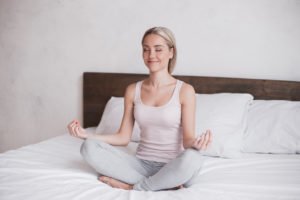We are physical beings, and that physicality should not be seen in dualistic isolation from the self that we think we are: the thinking self. This is an idea that goes all the way back to the Greek philosopher Plato: the mind as ‘the true self’, with flesh consigned to lower status.
A learned colleague of mine, a philosophy professor no less, quipped, ‘I consider my body merely a transport mechanism for my head’. It wasn’t until this “transport mechanism” began to break down that he was given cause to reassess this Cartesian stance.
By Cartesian, I refer to the 17th-century Dutch philosopher Rene Descartes who argued that the mind and the body are two different substances: thinking things and material things. He considered mind and body only tenuously connected – this is ‘Cartesian dualism’, and it’s the foundation stone of modern Western philosophy. In the Platonic sense, dualism is hierarchic: mind at the top and flesh at the bottom.

The mind, with its lofty ideals and visions of happiness, seems as different as could be from the fragility of blood and bone. But the mistake is to blame the body for our flaws, as if a pure mind is really just “the ghost in the machine”, in Gilbert Ryle’s memorable phrase. Thinking is not just something we do ‘in our mind’, divorced from the flesh. We are not minds who have bodies, we are bodies; and thinking, emotion, and notions of self are experienced through the flesh.
Dualism gives us an excuse for not exercising. It’s easy to see exercise as unnecessary and narcissistic. Viewed as such, it can kill off ambition. Pushing our intellect but not our muscles are thus seen as the higher ideal, and the denial of flesh laudatory.
Many of my PT clients exercise solely for extrinsic reasons. Unwittingly, they are worsening the very dualism that led to their sedentary lifestyle, portly shape, and health problems in the first place, viewing their bodies as machines that need repair. Once the symptoms are gone, the exercise stops; unless the obvious is pointed out: Fitness makes the body better equipped for any challenge.

Lessons from the Classical Greeks: Becoming Fully Human
“Many people’s minds are so invaded by forgetfulness, despondency, irritability, and insanity because of their poor physical condition that their knowledge is actually driven out of them.” Socrates
We can learn much from the Greeks of classical antiquity. They understood that to be physical is to be fully human, and that exercise was a way to savour their full humanity. Olympic events and their practice were not just pastimes or rehearsals for war, they were a means by which they could ‘polish their souls’. Exercise offered them virtues and pleasures, together with their hardened physiques.
As defined by Aristotle, virtue (the combination of practice, desire, and rational choice) is a ‘state of character’. In other words, it is a disposition, which is neither solely mental nor solely physical. It requires action, desire, thought and will.
Aristotle espoused something he called phronesis or ‘practical wisdom’. That is, thoughtful practice in varied circumstances, learned as much with one’s hands and feet as with one’s intellect.

Rejecting notions of mind-body dualism that were to predominate some two thousand years later, both Aristotle and Xenophon typified the Greek ideal: strive physically and mindfully, and enjoy the rewards.
‘We only have one life, and youth is brief. To be healthy without trying to run faster and longer, or harden one’s muscles, is to squander a chance to be more than one is; to miss the unique joy of striving, however painful.’ Xenophon
The Greeks had worked this out 300 years before Christ. Pushing yourself physically, and overcoming the fear of failure can develop virtues like consistency and humility. Now in the 21st century, we are rediscovering what many Greeks took for granted: exercise is a chance to educate our bodies and minds, at once.
If you feel quite ungifted athletically, and tempted to accept the way the genetic cards have fallen for you, a focus on this notion of virtue offers a motivating impetus and a deeply profound reason to keep exercising.
At this level of understanding, we go to the gym or the running track, not just to look better or delay the onset of death, but as we stick at it over an ever-lengthening period of time, our character alters along with our body. We are more proud, humble, generous and constant.

This is a lesson that goes all the way back to the greatest minds of Greek Antiquity: what we get out of the gym is more than just an attractive shape– it is a more defined version of ourselves.
This is why ‘working out’ should be seen as intrinsically worthwhile (not merely extrinsically essential). The pain reminds you that you are alive, that striving to be better is what greases the groove of existence; it celebrates the whole human being, not the compartmentalised mind distinct from the feeble flesh.
Reminding yourself of this allows you to enjoy exercise even in the teeth of failure or perceived lack of progress. It’s a commitment to enhancing and rejoicing in your full humanity.
J.A. Gleeson is a Personal Trainer at Tribe Social Fitness, Sutherland Shire, Sydney.
https://thecarousel.com/health/the-k-i-s-s-approach-to-health-5-simple-ways-to-a-healthy-you/